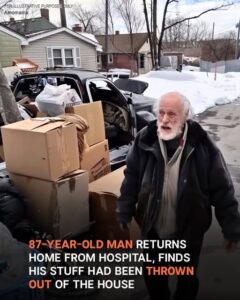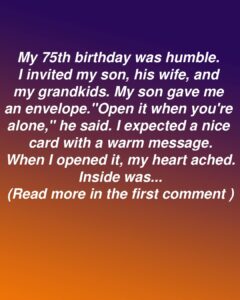What more did he tell them, I asked? “He said when people help each other, it keeps the world from falling apart,” Milo added, glancing at me.
I was struck by that line. if it was because it was from a stranger, or if my sons, who often couldn’t sit still for five minutes without fighting or throwing snacks at one another, had halted everything for him. I’m not sure why precisely. Seeing two small anchors descend into position and steadie someone else was like that.
Life continued on its way, and we continued to walk. But I couldn’t get that man out of my head. The way his voice shook when he thanked them, his cheeks, and his hands, which were thick with calluses and age marks. He hadn’t come across as pathetic. I just paused. As if he had been waiting for another opportunity to be noticed.
That night, when my wife and I were avoiding a wild Nerf dart fight and folding laundry, I brought it up to her. When she’s proud but doesn’t want the kids to hear and become arrogant, she grinned in such way. She remarked, “You’re raising good men.”
It warmed me, but I shrugged. It did.
Tyrese requested if we might stop by the crosswalk after soccer practice the following afternoon. He muttered, “Just to check if he’s there.” I didn’t think he would remember, much less desire to return. Sure, I replied.
He wasn’t present.
Two days later, we returned. Nothing has changed. After a week passed, I assumed that was it.
However, Milo pulled my sleeve as we were leaving the doughnut store down the street on the third Sunday. “Dad,” he nodded toward the corner and muttered.
He was there. The same walker and the same light jacket, but one that appeared slightly cleaner. This time, though, he wasn’t having any difficulties. He was seated and spoke with a woman who was giving him a tiny cup of coffee. Like old friends, they laughed.
We didn’t pause. merely observed for a while. Tyrese grinned. “He looks better.”
I gave a nod. “He does, indeed.”
“Do you think we were helpful?” Milo inquired.
I answered, “I believe you did.” “I believe you made him aware that he wasn’t invisible.”
Weeks went by. School resumed. Tyrese developed a baseball obsession. Milo developed a new interest in gathering unusual rocks and calling them “meteorite fragments.” It was some time before we saw the man again.
The school’s “Family and Community Day” followed. It was one of those gatherings where community members were requested to share their personal stories and parents were allowed to view school work. I barely made it in time because I was balancing a deadline at work. I noticed Tyrese on stage with a microphone in his hand as I was sneaking into the gym’s back.
He wasn’t discussing his recent acquisition of new cleats, baseball, or the game-winning goal he once scored. He was referring to the day with the crosswalk.
Tyrese said in a firm voice, “He said people walk past him all the time.” “But it was like he remembered who he used to be after we helped him.”
Beside him, Milo held a pair of sneakers and a drawing of a soccer ball on a poster board. He claimed that before to his injury, he played in a local league. mentioned having a sibling. And that because he was so quick, they used to call him “Rocket.”
There was silence in the gym. Really quiet. One of the younger children was coughing next to the juice table.
Tyrese then stated, “His name is unknown to us. However, we continue to consider him. And when we’re not there, we hope someone else helps him as well.
A couple of parents approached me after that. “I hope my son grows up like yours,” a tearful mother added.
I became interested that evening. More than inquisitive—almost motivated. The thought that this man, this so-called “Rocket,” might still be alive persisted in my mind. I went into full detective mode, something I hadn’t done since college.
I made inquiries. began at the poolside community center. Next was the Thursday senior recreation group. After a while, I was directed to a veteran’s housing complex that was only two blocks from the crosswalk.
I smiled nervously as I went there with a basket of oranges. asked if they knew an older man who used a walker and may have played soccer in the past at the front desk.
The receptionist narrowed her eyes. “Mr. Calder, are you sure?”
I couldn’t identify the name. However, I gave a nod.
She grinned. Yes, we refer to him as Coach. Wait a moment.
I was shown to a small common room by a staff worker a minute later, where four men were seated around a card table, giggling over a shabby deck of Uno. One of them looked up, and I knew who he was right away.
He grinned. “Hey. You are the father.
I blinked. “Do you recall us?”
He laughed and remarked, “It’s hard to forget two kids who save you from traffic and then bow like you’re royalty.” “Come sit down.”
We spent an hour talking. Walter Calder was his name. He spent over two decades as a young soccer coach. He lost his mobility due to a spinal illness that persisted for too long, and he lost his sibling in an accident. He acknowledged that he had been going through a difficult time, but that day at the crosswalk changed him.
He remarked, “It felt like I counted again.” “As if someone noticed me and realized I wasn’t just an elderly man on wheels.”
After that, he informed me, he began to visit the park more frequently. I was asked to assist with a walking club by a woman from the community center. He even began working at an after-school program for children, where he would demonstrate passing skills from his chair.
I left with his phone number, two Tyrese coaching recommendations, and an agreement to visit with the lads the following weekend.
The children brightened up as I told them. Tyrese immediately went to his room and retrieved his old ball. “Told you we helped,” Milo simply smiled.
After that, we went to see Coach Calder every Sunday. He would occasionally bring stories, and we would occasionally offer refreshments. He told me of matches he played in the 1970s that sounded more like wars than sports, and he taught the boys methods and strategies. After a while, my wife also arrived and made cookies that he feigned not to enjoy but always ate seconds of.
Tyrese immediately nominated him when our rec league needed a new assistant coach a year later. They gave him a foldable chair with his name on it, a clipboard, and a whistle.
Coach Calder broke down in tears.
I did, too.
In retrospect, it’s incredible how a seemingly insignificant incident—two children assisting a stranger in crossing the street—grew into something so significant. A companionship. Another chance. Even a legacy.
One pause was the beginning of it all. There is just one option to care.
I suppose I’m asking you this: who may be standing at the edge of your crosswalk?
Please share this story if it touched you. Who knows who might require the reminder? 💙




